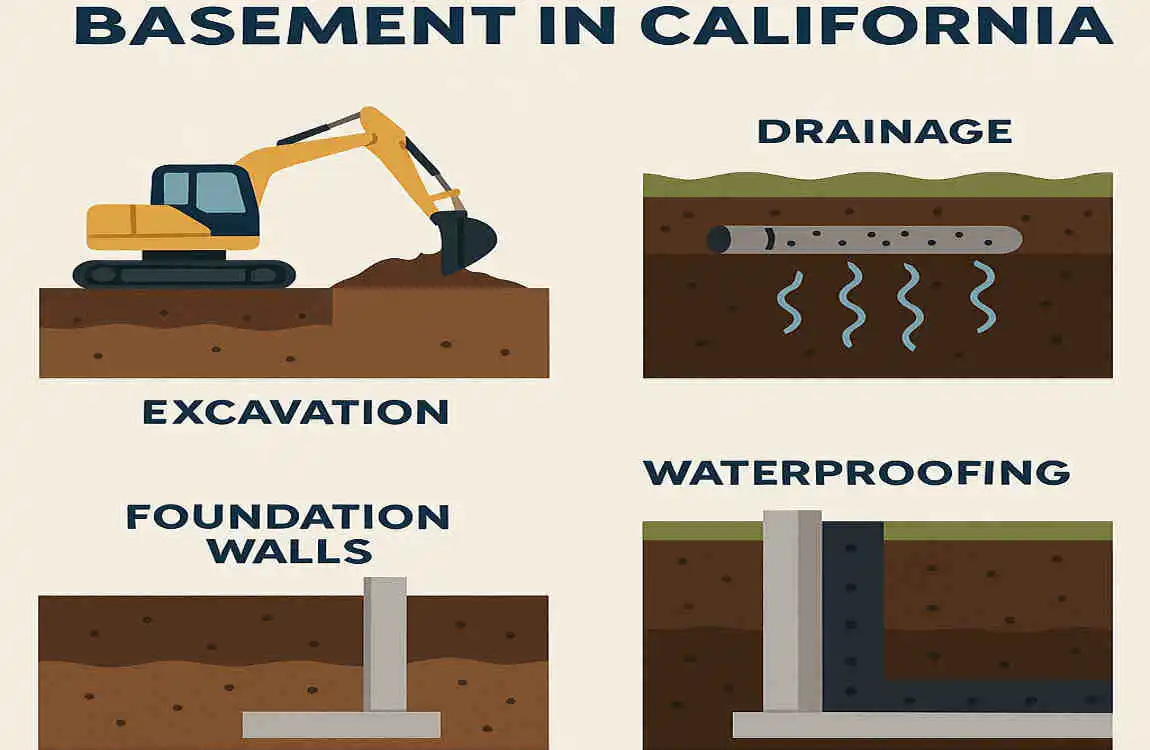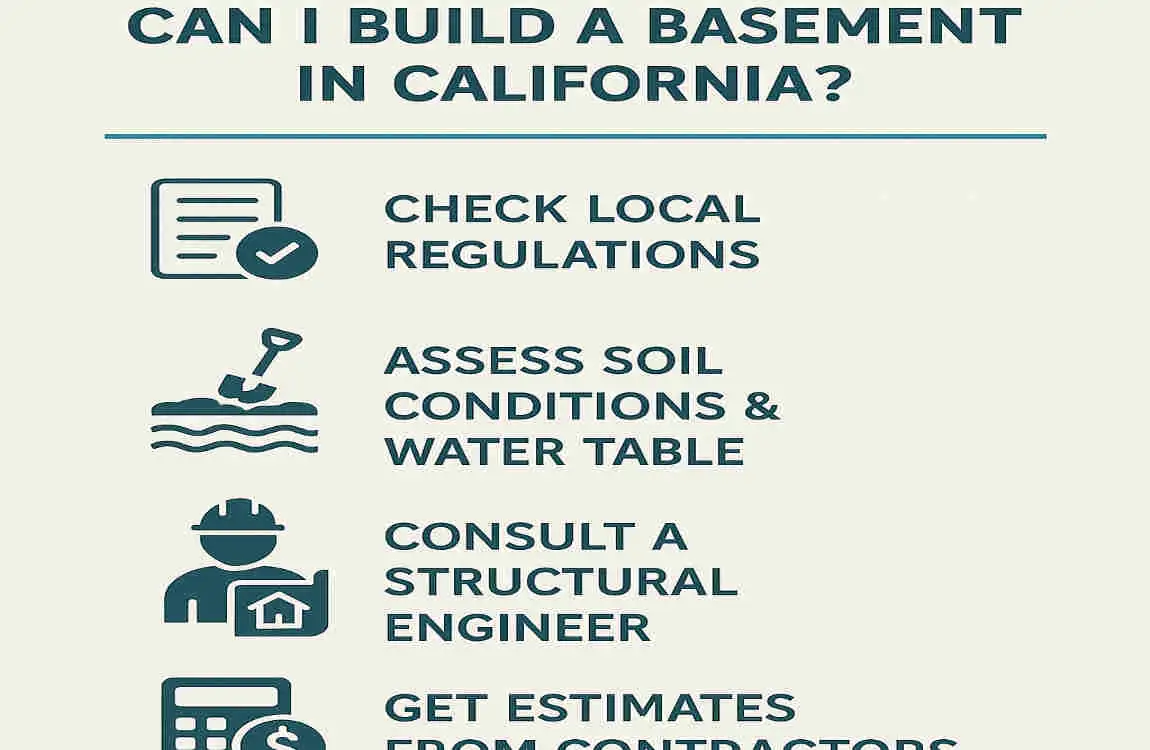Are you a homeowner in California dreaming of adding a basement to your home? Maybe you’re wondering if it’s even possible to build a cellar in the Golden State. Well, you’re in the right place!
From understanding the legalities and feasibility to navigating the complex world of building codes and permits, we’ve got you covered. We’ll also dive into the unique challenges and requirements of building a basement in California, along with the potential benefits and drawbacks.
Basics of Building a Basement in California

Is It Legal to Build a Basement in California?
First things first, let’s address the big question on your mind: can you build a basement in California? The short answer is yes, but there are some essential factors to consider.
While basements are not as common in California as they are in other parts of the country, they are indeed legal to build. However, the feasibility of constructing a basement in your specific location depends on factors such as soil conditions, groundwater levels, and local building codes.
Common Misconceptions About Basement Feasibility
Many homeowners in California believe that building a basement is impossible or not worth the effort. But that’s not necessarily true! With the proper planning, expertise, and adherence to regulations, a basement can be a valuable addition to your home.
One common misconception is that California’s soil is too unstable for basement construction. While it’s true that the state is prone to earthquakes and has diverse soil conditions, proper geotechnical evaluations and engineering can overcome these challenges.
State and Local Regulations
When it comes to building a basement in California, you’ll need to navigate a web of state and local regulations. The California Building Code, also known as Title 24, sets the baseline standards for construction, including basement requirements.
However, building codes can vary significantly from one city or county to another. It’s crucial to research and understand the specific regulations in your area before embarking on your basement project.
Understanding California Building Codes and Permits
The California Building Code and Title 24 Compliance
The California Building Code, or Title 24, is a set of regulations that govern construction in the state. When it comes to basements, Title 24 covers structural integrity, fire safety, plumbing, and electrical systems.
To ensure your basement is compliant with Title 24, you’ll need to work with licensed professionals who are well-versed in these regulations. They can help you design and construct a basement that meets all the necessary standards.
Permits Required for Basement Construction
Before you can start digging, you’ll need to obtain the proper permits for your basement construction project. The specific licenses required can vary depending on your location and the scope of your project, but some common ones include:
- Building permit
- Grading permit
- Plumbing permit
- Electrical permit
Your local building department can guide you through the permit application process and let you know precisely what you need to submit.
The Importance of NBC (National Building Code) Standards
In addition to complying with the California Building Code, your basement must also meet the National Building Code (NBC). The NBC covers aspects such as structural safety, fire protection, and accessibility.
By adhering to NBC standards, you can ensure that your basement is not only legal but also safe and durable. This is especially important in a state like California, which is prone to natural disasters like earthquakes.
Applying for Permits and Preparing Documents
The process of applying for permits can seem daunting, but it’s crucial to ensuring your basement project is legal and compliant. To apply for permits, you’ll typically need to submit:
- A detailed set of construction plans
- A site plan showing the location of your home and the proposed basement
- A geotechnical report assessing the soil conditions on your property
- A structural engineering report detailing the design of your basement
Your architect or contractor can help you prepare these documents and navigate the permit application process.
Building Inspections During Construction
Once you’ve obtained your permits, you’ll need to be prepared for regular building inspections throughout the construction process. These inspections are in place to ensure your basement is built according to code and is safe and structurally sound.
Some common inspections you can expect during basement construction include:
- Foundation inspection
- Framing inspection
- Plumbing and electrical inspections
- Final inspection
Be sure to work closely with your contractor to schedule these inspections and address any issues that arise promptly.
Key Construction Requirements and Challenges
Soil Conditions and Geotechnical Evaluations
One of the biggest challenges of building a basement in California is dealing with the state’s diverse and sometimes unstable soil conditions. Before you can start construction, you’ll need a geotechnical evaluation of your property.
A geotechnical engineer will assess the soil composition, stability, and bearing capacity to determine if your site is suitable for basement construction. They may recommend additional measures, such as soil stabilization or special foundation designs, to ensure the long-term integrity of your basement.
Groundwater and Drainage Considerations
Another essential factor to consider when building a basement in California is groundwater. The state’s climate and topography can lead to high water tables and drainage issues, posing a threat to your basement’s structural integrity and habitability.
To mitigate these risks, you’ll need to implement proper drainage systems, such as French drains or sump pumps, to keep water away from your basement. You may also need to waterproof your foundation walls and floors to prevent moisture intrusion.
Structural Requirements
Building a basement that can withstand California’s unique conditions requires careful attention to structural design and materials. Some key structural elements to consider include:
- Foundation walls: These need to be designed to resist lateral earth pressures and withstand seismic forces.
- Floors: Your basement floor should be strong enough to support the weight of the structure above and any additional loads.
- Framing: The framing of your basement walls and ceiling should be designed to resist seismic forces and provide adequate support for finishes.
- Waterproofing: Proper waterproofing is essential to keep your basement dry and habitable.
Working with a structural engineer and experienced contractor is crucial to ensuring that your basement meets all these requirements and is built to last.
Earthquake Safety Measures
As a homeowner in California, you know that earthquakes are a fact of life. That’s why it’s essential to incorporate earthquake safety measures into your basement design.
Some standard earthquake-resistant features to consider include:
- Reinforced concrete walls and floors
- Seismic tie-downs and anchors
- Flexible utility connections
- Adequate egress routes for emergency exits
By incorporating these features into your basement design, you can help protect your home and family in the event of an earthquake.
Fire Protection, Ventilation, Plumbing, and Electrical Systems
In addition to structural considerations, your basement must meet specific standards for fire protection, ventilation, plumbing, and electrical systems.
- Fire protection: This may include installing fire-resistant materials, fire sprinklers, and smoke detectors.
- Ventilation: Basements can be prone to moisture and poor air quality, so proper ventilation is essential. This may include installing exhaust fans, air vents, or a heat recovery ventilation system.
- Plumbing: Your basement will need to be plumbed for any bathrooms, kitchens, or laundry facilities you plan to include. This may require installing new sewer lines or connecting to existing plumbing.
- Electrical systems: You’ll need to run electrical wiring to your basement and install outlets, lighting, and any other electrical components you need. Be sure to work with a licensed electrician to ensure that your electrical system is safe and up to code.
Managing Moisture, Dampness, and Limited Natural Light
Basements can be prone to moisture and dampness, which can lead to mold growth and other issues. To combat this, you’ll need to implement proper moisture management strategies, such as:
- Installing a vapor barrier on the walls and floor
- Using dehumidifiers to control humidity levels
- Ensuring proper drainage around the perimeter of your home
Another challenge of basement living is the limited natural light. To make your basement feel more open and inviting, consider incorporating:
- Egress windows that meet code requirements
- Light wells or window wells to bring in more natural light
- Artificial lighting that mimics natural light, such as LED or full-spectrum bulbs
By addressing these challenges head-on, you can create a comfortable and functional basement space that you and your family will love.
Local Variations and Zoning Regulations
City and County Building Code Variations
While the California Building Code provides a baseline for construction standards, building codes can vary significantly from one city or county to another. It’s essential to research and understand the specific regulations in your area before starting your basement project.
Some cities, like Los Angeles and San Francisco, have their own unique building codes and requirements for basement construction. For example, Los Angeles has specific requirements for seismic retrofitting and fire sprinklers in basements, while San Francisco has strict guidelines for waterproofing and drainage.
Examples of Major Cities with Specific Basement Rules
To give you a better idea of what to expect, let’s take a closer look at the basement construction rules in some of California’s major cities:
- Los Angeles: Basements in Los Angeles must be designed to withstand seismic forces and may require additional reinforcement. Fire sprinklers are typically needed in basements, and there may be specific requirements for egress windows and emergency exits.
- San Francisco: Basements in San Francisco must be waterproofed to prevent moisture intrusion, and proper drainage systems are required. There may also be specific requirements for foundation design and soil stabilization.
- San Diego: Basements in San Diego are subject to the exact general building code requirements as the rest of the state, but there may be additional zoning restrictions or height limitations to consider.
Zoning Restrictions and Allowances
In addition to building codes, you’ll also need to navigate zoning regulations when planning your basement construction project. Zoning laws dictate how your property can be used and what types of structures can be built on it.
Some common zoning considerations for basement construction include:
- Size restrictions: There may be limits on the size of your basement relative to the size of your home or lot.
- Usage restrictions: Your zoning may dictate what types of activities can take place in your basement, such as living space, storage, or commercial use.
- Egress requirements: Depending on your zoning, you may need to provide a certain number of egress windows or emergency exits from your basement.
Be sure to check with your local zoning department to understand the specific regulations that apply to your property.
Impact on Project Cost and Timeline
Navigating local building codes and zoning regulations can significantly impact the cost and timeline of your basement construction project.
Additional requirements, such as seismic retrofitting or fire sprinklers, can add to the overall cost of your project. Similarly, the need for specialized engineering or design work to meet local codes can also drive up expenses.
The permitting and inspection process can also add time to your project timeline. Depending on your location and the complexity of your project, it may take several weeks or even months to obtain all the necessary permits and complete the required inspections.
To minimize delays and cost overruns, it’s essential to work with experienced professionals who are familiar with the local regulations and can help you navigate the process efficiently.
Practical Steps for Homeowners

Step-by-Step Guide to Basement Construction
Now that you have a good understanding of the key considerations and challenges involved in building a basement in California, let’s walk through the practical steps you’ll need to take to bring your project to life.
- Planning and Design: Start by working with an architect or designer to create a detailed plan for your basement. Consider your needs, budget, and the unique challenges of your site.
- Hiring Professionals: Assemble a team of licensed professionals, including a general contractor, structural engineer, and geotechnical engineer, to help you execute your plan.
- Applying for Permits: Work with your team to prepare the necessary documents and submit your permit applications to your local building department.
- Construction: Once your permits are approved, your contractor can begin construction. This will typically involve excavation, foundation work, framing, and finishing.
- Inspections: Throughout the construction process, be prepared for regular inspections by your local building department to ensure that your project is meeting all the necessary codes and standards.
Importance of Hiring the Right Professionals
Building a basement in California is a complex project that requires the expertise of various professionals. Here are some key roles to consider:
- Geotechnical Engineer: A geotechnical engineer will assess the soil conditions on your property and provide recommendations for foundation design and construction.
- Architect: An architect can help you design a functional and aesthetically pleasing basement that meets all the necessary codes and standards.
- Licensed Contractor: A licensed general contractor will oversee the construction process and ensure that your project is completed on time, within budget, and to the highest standards of quality.
- Structural Engineer: A structural engineer will design the structural elements of your basement, such as the foundation walls and framing, to ensure that they can withstand the unique forces and conditions in California.
By assembling a team of experienced professionals, you can ensure that your basement project is a success.
Budget Considerations and Potential Cost Factors
Building a basement in California can be a significant investment, so it’s essential to carefully consider your budget and potential cost factors. Some key expenses to keep in mind include:
- Excavation and foundation work: This can be one of the most expensive parts of the project, especially if you need to deal with challenging soil conditions or high groundwater levels.
- Structural engineering and design: The need for specialized engineering and design work to meet local codes and standards can add to the overall cost of your project.
- Permits and inspections: The cost of permits and inspections can vary depending on your location and the scope of your project.
- Finishing and fixtures: The cost of finishing your basement, including flooring, walls, ceilings, and fixtures, will depend on the level of quality and customization you desire.
To help manage your budget, consider working with your contractor to prioritize your needs and identify potential cost-saving measures.
Tips for Maintaining Compliance and Avoiding Delays
Navigating the complex world of building codes and permits can be challenging, but with the right approach, you can maintain compliance and avoid costly delays or penalties. Here are some tips to keep in mind:
- Work with experienced professionals: Your architect, contractor, and other team members should be well-versed in local building codes and regulations.
- Submit complete and accurate permit applications: Make sure you include all the necessary documents and information to avoid delays in the permit approval process.
- Schedule inspections proactively: Work with your contractor to schedule inspections at the appropriate stages of construction to keep your project on track.
- Address issues promptly: If any problems or violations are identified during inspections, address them promptly to avoid delays and penalties.
By following these tips and working closely with your team, you can ensure a smooth and successful basement construction project.
Benefits and Drawbacks of Building a Basement in California
Advantages of Adding a Basement
There are several potential benefits to adding a basement to your California home:
- Increased living space: A basement can provide valuable additional living space for your family, whether you use it as a recreation room, home office, or extra bedrooms.
- Increased property value: A well-designed and finished basement can add significant value to your home, making it a worthwhile investment.
- Storage options: Basements can provide ample storage space for seasonal items, holiday decorations, or other belongings you don’t need to access frequently.
Drawbacks and Challenges
However, there are also some potential drawbacks and challenges to consider:
- Higher costs: Building a basement in California can be more expensive than in other parts of the country due to the unique challenges and requirements.
- Regulatory challenges: Navigating the complex web of building codes and permits can be time-consuming and frustrating.
- Water and seismic risks: California’s climate and geology can pose challenges and dangers to basement construction, including high groundwater levels and seismic activity.
Decision-Making Advice for California Homeowners
Ultimately, the decision to build a basement in California will depend on your specific needs, budget, and property. Here are some questions to consider as you make your decision:
- What are your goals for the space? Do you need additional living space, storage, or a specific type of room?
- What is your budget? Can you afford the potential costs of basement construction in California?
- What are the unique challenges of your site? Do you have soil stability issues, high groundwater levels, or other factors that could impact your project?
By carefully considering these factors and working with experienced professionals, you can make an informed decision about whether a basement is right for your California home.




